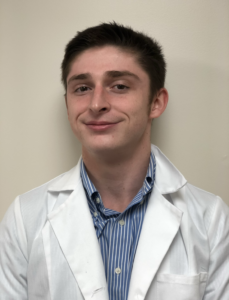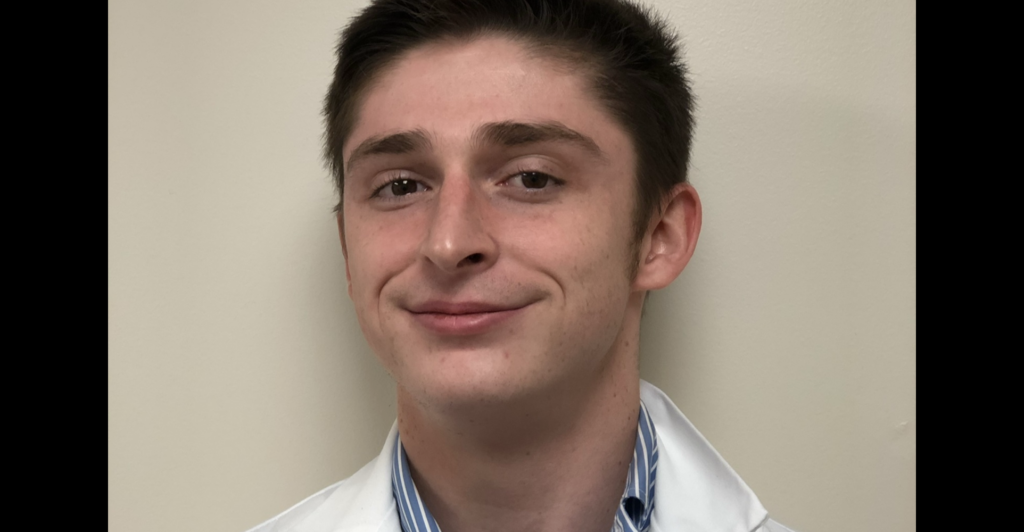We’re taking time to get to know the members of the GSA’s Early Career Scientist Committees. Join us to learn more about our early career scientist advocates.

Daniel J. Gironda
Policy and Advocacy Subcommittee
Wake Forest School of Medicine
Research Interest: Metastasis, the spread of cancer from a primary tumor to a secondary organ site, is the number one cause of death among cancer patients. How can we monitor this process and prevent it from happening in the first place? My current research aims to explore the genetic mechanisms and identify genetic vulnerabilities in patients with peritoneal surface malignancy (PSM). PSM is an aggressive type of metastatic spread that presents as multiple tumors growing on multiple sites throughout the abdominal cavity. Given that each individual patient, as well as each individual tumor, is genetically unique, we can aggregate and compare PSM tumors across pre-treated patients to identify common pathways of tumor growth and potentially targetable genes of interest. Moving forward, we hope to accumulate large sets of sequencing information on these tumors to which we can utilize the newfound vulnerabilities for therapeutic applications.
As a second-year doctoral student, I aspire to become an expert in genomic and transcriptomic analyses for elucidating the biological pathways of PSM. To do this, our lab collaborates with the Wake Forest Organoid Research Center (WFORCE) to create patient-derived tumor organoids (PTOs) for individual tumor modelling. Because the cells used to create the PTOs are isolated from each individual tumor from each patient, the PTO is one of the most physiologically relevant tumor models for precision medicine to date. With our PTO models, we will perform drug screening assays, followed by sequencing techniques, to determine the biological mechanisms that select for chemoresistance, metastasis, and recurrence. Through the isolation and sequencing of these PTOs after primary surgery, we hope to identify novel gene clusters that can tailor treatment at the individual patient level.
As a PhD-trained scientist, you have many career options. What interests you the most?
Multiple areas interest me. However, given the instability of funding in academia, pursuing a career in science policy is of high interest. Despite improvements in the availability of resources for young scientists, the funding infrastructure is not well equipped to continuously promote innovation. With the current R01 (the primary and oldest grant offered by the NIH) acceptance rate of ~8%, we are narrowing the playing field for potentially transformative biomedical research due to the restrained budget. However, what if we were to reallocate resources from state or federal institutions with significant financial surpluses to create a better funded environment for prospective research? Instead of allowing the average taxpayer’s dollars to die with these surpluses, we could optimize the distribution of funds to support humanity-promoting research and education. As a playmaker in the fund allocation decision process, I hope to open a fountain of resources for up-and-coming scientists. By highlighting the importance of new research, as well as transparently showing how the funds will be distributed, more interest in the realm of research will be generated and will promote the relevance of game-changing projects.
If a position in science policy is not in my cards, pursuing a director role for clinical research and development (R&D) at a startup biotech company would be of high interest as well. Similar to academic faculty members, clinical R&D directors have a fair amount of freedom to direct their own research. Because this position is in private industry, there is much more flexibility for funding one’s research while still being free to collaborate with academic institutions. Of course, like any position, it is highly competitive, and one has to stay prolific in terms of patents, grants, and scientific publications. Yet, with the freedom to perform independent research with more access to resources, working in industry seems to be a great option for up-and-coming scientists. But hey, I am still early on in the process—you can never predict where you will end up next, you know?
In addition to your research, how do you want to advance the scientific enterprise?
Actively communicating and exchanging with the general public is the most proactive way to advance the scientific enterprise. Generating interest, or sharing foundational knowledge as to why one should be interested, is the most important factor for selling an idea or product. Educating individuals who are opposed to new scientific endeavors is the best way to create confidence and trust around the field, as well as to better demonstrate the significance of new research. As an educator across multiple disciplines throughout my undergraduate career, I see no better way to give back to the general population as an academic than by educating through open dialogue. Science is only as powerful as the audience it reaches. Integrating non-scientists into the scientific thought process—as well as having open discussions about past beneficial discoveries, our current state of scientific progress, and our future—can expand their way of viewing science as a whole. Similar to TEDx and other platforms for sharing thoughts and ideas, I would want to go to underserved communities and organize town halls to have these conversations. More often than not, the disconnect between scientists and the average person is due to their lack of candid conversations—there is not much overlap between our day-to-day lives. However, this lack of human connection hampers our ability to reach out to the general public. As humans, we need to find a general understanding amongst one another before any progress can be made. We cannot unify scientists and non-scientists until we open the door and speak candidly. We not only wish to educate but also hope to inspire the average individual and open their mind as to what heights mankind can reach. As Johann Wolfgang von Goethe wrote, “Knowing is not enough; we must apply. Willing is not enough; we must do.” Through open and honest dialogue with the general public, I hope to expand general interest in the scientific community and enroll others to contribute to the field.
As a leader within the Genetics Society of America, what do you hope to accomplish?
First and foremost, I want to leverage the GSA platform by promoting better STEM education at the elementary, middle, and high school levels in my local community, as well as the greater state and country. Due to the pandemic, many young students have been deprived of a traditional education—one in which they can directly interact and converse with their educators. Hands-on instruction is crucial to the learning process, and educators across all age groups recognize that online schooling is not enough to meet these needs. As a member of the policy and advocacy subcommittee, I hope to speak with local politicians on how to improve our school systems through a hands-on approach. Educational reconfiguration has to start with how we train our teachers. This training may be done through a thought-out, rigorous, and standardized curriculum across the board for each subject type, in addition to increasing the number of resources given to these educators and students to facilitate the revamping. Educating young scientists and future members of the work force follows a pyramid structure—one is only as knowledgeable as the base on which one’s knowledge is built. By promoting stronger analytical skills from a young age, we would provide our kids with a framework that will build a better tomorrow.
Second, I wish to collaborate with and expand the current research network I am involved in. Collaboration is the key to validating strong science and keeping the scientific community liable. It is fine to have strong science and prestige as an independent force, but what is its true value if others cannot replicate and validate the legitimacy of one’s findings? As a leader within the GSA, I aspire to be a strong proponent in increasing scientific stringency, rigor, and accountability across multiple research disciplines.
I am always up for talking about science, politics, or general life questions with awesome people. Reach out to me with the links below to connect!
Previous leadership experience
Presidential member of the Genetics Society of America (2022–Present)
Co-chair for the Skin, Wound Healing, and Inflammation Scientific session, Tissue Engineering and Regenerative Medicine International Society-Americas (TERMIS-AM) 2022 annual meeting
Recipient of the Outstanding New Member award, Rutgers University, New Brunswick: Office of Fraternity and Sorority Affairs (2018)
Lead tutor at the Livingston Writing Center of Rutgers University, New Brunswick (2016–2018)
Graduate of the Torch Academy, a goal-setting and leadership training program (2012)
You can contact Daniel J. Gironda on Twitter @DanielJGironda, or on LinkedIn @DanielJGironda, and read their publications here.





